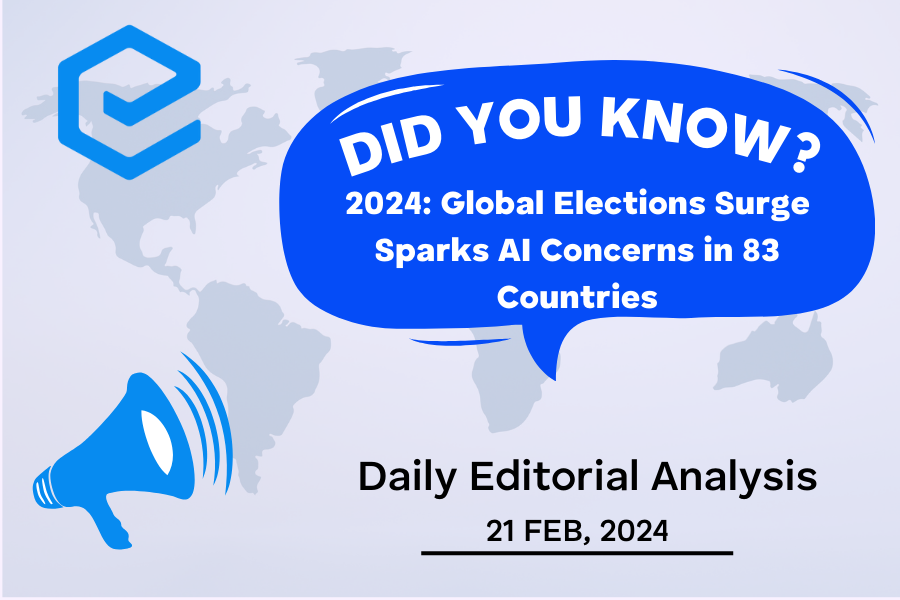
In 2024, the world witnessed an unprecedented surge in global elections, igniting concerns about the role of artificial intelligence (AI) in shaping political outcomes across 83 countries. This surge underscores the growing reliance on AI-driven technologies in electoral processes, raising critical questions about transparency, accountability, and potential manipulation. While AI promises efficiency and accuracy, its increasing integration into political systems demands careful scrutiny to safeguard democratic principles and ensure fair representation. As nations grapple with the complexities of AI-driven politics, it becomes imperative to establish robust regulatory frameworks and ethical guidelines to mitigate risks and uphold the integrity of democratic institutions in the digital age.
Tag: GS-2 Elections, IR
Contents
- 1 In News:
- 2 Unintended Consequences of Hasty AI Regulations
- 3 Solutions for Policymakers
- 4 A Measured Approach for Future-Proof Regulation
- 5 Frequently Asked Questions (FAQs)
- 5.1 1. What triggered the surge in global elections in 2024?
- 5.2 2. How many countries were affected by the surge in global elections, and why is this significant?
- 5.3 3. What specific concerns regarding artificial intelligence (AI) emerged in relation to these elections?
- 5.4 4. What are some potential risks associated with the increasing reliance on AI in electoral processes?
- 5.5 5. How can nations address these concerns and mitigate the risks associated with AI in elections?
- 6 In case you still have your doubts, contact us on 9811333901.
In News:
In 2024, labeled as the paramount election year by a global magazine, almost half the world’s population is set to participate. Amidst traditional challenges, a novel threat in the digital realm, propelled by AI, has surfaced.
Unintended Consequences of Hasty AI Regulations
Disinformation Surge
- The proliferation of disinformation, exemplified by manipulated videos affecting political figures, poses a significant challenge.
- Example: Manipulated video of Bangladesh Nationalist Party leader Tarique Rahman impacting voter sentiments.
- Meta’s delayed response raises questions about content moderation efficacy.
- Reduction in content moderation staff amplifies the challenge, a consequence of 2023 layoffs.
- Pressure to prioritize interventions in influential markets may leave voters in less prominent regions vulnerable.
Concentration and Ethical Lapses
- AI regulations risk reinforcing industry concentration despite good intentions.
- Requirements like watermarking and red-teaming may favor tech giants, hindering smaller companies.
- Regulations may consolidate power, raising concerns about ethical lapses, biases, and control by dominant entities.
- Developing ethical frameworks introduces challenges, including divergent opinions on priorities.
- Lack of laws mandating AI system audits raises transparency concerns.
- Differing views on AI risks being existential or immediate add complexity.
- Indian context: PM’s Economic Advisory Council members argue risk management is challenging due to AI’s non-linear, evolving nature.
Solutions for Policymakers
Addressing Democracy’s Challenges Alongside AI Threat
- Recognize persistent challenges to global democracy, such as unjust imprisonments and electoral disruptions.
- Vote-buying and ballot-stuffing, ingrained in the democratic process, provide a backdrop for AI threats.
Balancing Urgency with Sensible Regulation
- Caution against hasty AI regulations following the frenzy of 2023.
- Balance addressing AI threats with the potential for unintended consequences and the complexity of regulating a rapidly evolving landscape.
Planning for Future Challenges
- Advocate for a forward-thinking approach by AI regulators.
- Anticipate and formulate rules that address current risks and proactively tackle future challenges.
- Emphasize the need for a regulatory framework that evolves with the rapid pace of technology.
A Measured Approach for Future-Proof Regulation
- Acknowledge the significance of addressing AI-related electoral risks.
- Caution against hasty regulatory measures and emphasize the importance of foresight.
- Regulators must anticipate future risks to ensure rules remain relevant beyond 2024.
- Advocate for a measured approach to strike a balance between immediate concerns and avoiding unintended consequences in the complex landscape of AI and democracy.
Source: IE
Frequently Asked Questions (FAQs)
1. What triggered the surge in global elections in 2024?
- The surge in global elections in 2024 was largely driven by a variety of factors including geopolitical shifts, societal unrest, and the increasing demand for democratic reforms in numerous countries worldwide.
2. How many countries were affected by the surge in global elections, and why is this significant?
- The surge impacted 83 countries globally, highlighting the widespread nature of political movements and demands for change. This significant number underscores the interconnectedness of global politics and the universal pursuit of democratic principles.
3. What specific concerns regarding artificial intelligence (AI) emerged in relation to these elections?
- Concerns about AI in elections centered on issues of transparency, accountability, and potential manipulation. There were fears that AI-driven technologies could be used to influence electoral outcomes, raising questions about the fairness and integrity of the democratic process.
4. What are some potential risks associated with the increasing reliance on AI in electoral processes?
- Risks include the possibility of biased algorithms, lack of oversight leading to manipulation, privacy violations through data mining, and the potential for disenfranchisement if AI systems are not accessible or understood by all segments of society.
5. How can nations address these concerns and mitigate the risks associated with AI in elections?
- Nations can address these concerns by implementing robust regulatory frameworks to oversee the use of AI in elections, promoting transparency in algorithms and data usage, ensuring cybersecurity measures are in place to safeguard against manipulation, and fostering public awareness and education about the role of AI in electoral processes.
In case you still have your doubts, contact us on 9811333901.
For UPSC Prelims Resources, Click here
For Daily Updates and Study Material:
Join our Telegram Channel – Edukemy for IAS
- 1. Learn through Videos – here
- 2. Be Exam Ready by Practicing Daily MCQs – here
- 3. Daily Newsletter – Get all your Current Affairs Covered – here
- 4. Mains Answer Writing Practice – here

